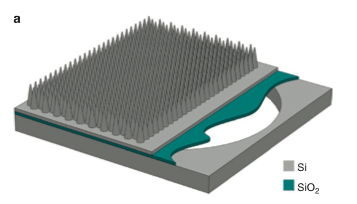Yuerui Lu, a student of Amit Lal, Cornell University’s Professor of electrical and computer engineering, has developed a photonic crystal nanowire array-based biosensor, which is capable of performing low-cost, highly sensitive and rapid test for detecting disease markers and similar molecules at ultra-low concentrations, paving the way to identify diseases at an early stage.
 A schematic drawing of the biosensor, which consists of ordered nanowires on top of a silicon-silicon dioxide membrane (Credit: Yuerui Lu)
A schematic drawing of the biosensor, which consists of ordered nanowires on top of a silicon-silicon dioxide membrane (Credit: Yuerui Lu)
The nanomechanical biosensor is a 50-µm diameter mechanical resonator made of a thin membrane of silicon-silicon dioxide comprising closely stacked, neatly arranged vertical nanowires over it. This pattern provides a high surface-to-volume ratio for delivering high sensitivity to detect biomolecules at ultra-low concentrations down to fM.
The biosensor operates by bonding the nanowires with the single-stranded probe DNA molecules. When the molecules are brought in touch with a target single-stranded DNA, the respective molecules join together, causing a change in the mass recorded by the device, which in turn changes the device’s resonance frequency.
When the device is irradiated by a laser beam, the novel design of the device’s nanowires enables the absorption of over 90% of the light, causing an effective opto-thermo-mechanical agitation of the resonator. The change in the resonance frequency can be optically recorded rapidly and remotely without the use of electrical wires, facilitating the fabrication of the device at a lower cost.
Lal stated that the device can be used for clinical analysis, for instance in DNA testing wherein current methods compare DNA against a typical sequence, which are expensive and time consuming. The novel device can be coded with specific DNA series based on relevance, and those particular molecules can be identified in early stages when at lower concentrations, he said. Doctors can have a cartridge comprising a sequence of membrane sensors that allow the detection of DNA defects rapidly, he added.
The biosensor can be utilized for environmental monitoring purposes such as monitoring of water quality. The research team expects to upgrade the sensitivity of its device to some protein molecules, which is a challenge to the team, as those molecules do not attach as efficiently as DNA molecules do.